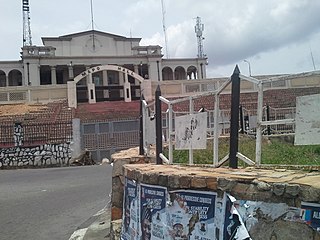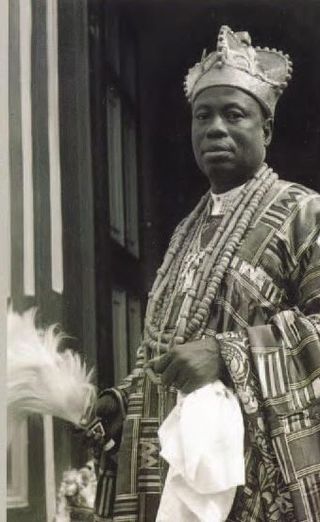
Nnamdi Benjamin Azikiwe, commonly referred to as Zik of Africa, was a Nigerian politician, statesman, and revolutionary leader who served as the 3rd and first black governor-general of Nigeria from 1960 to 1963 and the first president of Nigeria during the First Nigerian Republic (1963–1966). He is widely regarded as the father of Nigerian nationalism as well as one of the major driving forces behind the country's independence in 1960.

Obafemi Jeremiah Oyeniyi Awolowo was a Nigerian politician who served as the first Prime Minister of Nigeria. He was known as one of the key figure towards Nigeria's independence movement from 1957 to 1960. Awolowo founded the Yoruba nationalist group Egbe Omo Oduduwa as well as the Premier of the Western Region under Nigeria's parliamentary system from 1952 to 1959. He was the official opposition leader in the federal parliament to the Balewa government from 1959 to 1963.
The Nigerian Youth Movement (NYM) was Nigeria's first genuine nationalist organization, founded in Lagos in 1934 at Stanley Orogun, with Professor Eyo Ita as the founding father and many others, including Samuel L. Akintola, Chief Shonibare, and Chief Bode. Ernest Ikoli, the first editor of the Daily Times of Nigeria, launched in the month of June 1926, was another founding member. The group's immediate concerns included the supposedly inferior status of Yaba College, appointments of Africans to senior positions in the civil service and discriminations against the African truck drivers. However, organization at first, had generally moderate views and pledged to support and co-operate with the governor. The president was Dr Kofo Abayomi. Ernest Ikoli was vice president and H.O. Davies was the secretary. It was the first multi-ethnic organization in Nigeria and its programme was to foster political advancement of the country and enhance the socio-economic status of the Nigerian citizens. Adeyemo Alakija later became President of the NYM.

Chief Samuel Ládòkè Akíntọ́lá otherwise known as S.L.A. was a Nigerian politician, aristocrat, orator, and lawyer. He served as Oloye Aare Ona Kakanfo XIII of Yorubaland and served as premier of Western Nigeria from independence in 1960 till his assassination in 1966.
Egbé Ọmọ Odùduwà is a Nigerian political organisation established in 1945 by Yoruba leaders in London. Its initial purpose was to unite the Yoruba people in a manner similar to the tenets of the Ibibio State Union and the Igbo Federal Union. The organization grew in popularity from 1948 to 1951. In 1951, Egbé Ọmọ Odùduwà supported the formation of the Nigerian Political Party Action Group.
The Action Group (AG) was a Nigerian nationalist political party established in Ibadan on 21 March 1951, by Chief Obafemi Awolowo. The party was founded to serve as the platform for realizing his preliminary objective of mobilizing Western Nigerians to forestall the NCNC control of the Western Region and the subsequent aim of cooperating with other nationalist parties to win independence for Nigeria. It benefited immensely from the relationships developed in the Egbe Omo Oduduwa formed in Awolowo's days in London as a student.

The First Republic was the republican government of Nigeria between 1963 and 1966 governed by the first republican constitution. The country's government was based on a federal form of the Westminster system. The period between 1 October 1960, when the country gained its independence and 15 January 1966, when the first military coup d’état took place, is also generally referred to as the First Republic. The first Republic of Nigeria was ruled by different leaders representing their regions as premiers in a federation during this period.
Ernest Sissei Ikoli (1893–1960) was a Nigerian politician, nationalist and pioneering journalist. He was the first editor of the Daily Times, the president of the Nigerian Youth Movement, and in 1942, represented Lagos in the Legislative Council.
Eyo Ita (1903–1972) was a Nigerian educationist and politician from Creek Town, in present-day Cross River State, who was the leader of the Eastern Government of Nigeria in 1951 and the first Professor Nigeria ever had. He was one of the earliest Nigerian students who studied in the United States instead of the frequent route of studying in the United Kingdom. He was a deputy national president of the National Council of Nigeria and the Cameroons (NCNC) in the late 1940s and early 1950s.
Chief Hezekiah Oladipo Davies, Q.C. was a leading Nigerian nationalist, founding father, lawyer, journalist, trade unionist, thought leader and politician during the nation's movement towards independence in 1960 and immediately afterwards.

Mapo Hall is the colonial-style Ibadan City Hall on top of Mapo Hill in Ibadan, Oyo State, Nigeria. Mapo Hall was commissioned during the colonial era by Captain Ross in 1929.

Samuel Akisanya was a Nigerian trade unionist and nationalist based in Lagos, Nigeria during the colonial era, one of the founders of the Nigerian Youth Movement. He was also the Oba of Isara, an office which he held from 1941 until his death. He is today widely regarded as the greatest king in the history of the city.
Oloye Sir Kofoworola Adekunle "Kofo" Abayomi, KBE was a Nigerian politician who was one of the founders of the nationalist group, the Nigerian Youth Movement, in 1934 and went on to have a distinguished public service career. His last major public assignment was as chairman of the Lagos Executive Development Board from 1958 until 1966.

Nigerian nationalism asserts that Nigerians as a nation should promote the cultural unity of Nigerians. Nigerian nationalism is territorial nationalism and emphasizes a cultural connection of the people to the land, particularly the Niger and the Benue Rivers. It first emerged in the 1920s under the influence of Herbert Macaulay, who is considered to be the founder of Nigerian nationalism. It was founded because of the belief in the necessity for the people living in the British colony of Nigeria of multiple backgrounds to unite as one people to be able to resist colonialism. The people of Nigeria came together as they recognized the discrepancies of British policy. "The problem of ethnic nationalism in Nigeria came with the advent of colonialism. This happened when disparate, autonomous, heterogeneous and sub-national groups were merged to form a nation. Again, the colonialists created structural imbalances within the nation in terms of socio-economic projects, social development and establishment of administrative centres. This imbalance deepened the antipathies between the various ethnic nationalities in Nigeria ." The Nigerian nationalists' goal of achieving an independent sovereign state of Nigeria was achieved in 1960 when Nigeria declared its independence and British colonial rule ended. Nigeria's government has sought to unify the various peoples and regions of Nigeria since the country's independence in 1960.

The Cabinet of Abubakar Tafawa Balewa was the government of Nigeria, headed by Prime Minister Abubakar Tafawa Balewa, in the years leading up to and following independence. There were three cabinets. The first was established in 1957 when Balewa was appointed prime minister by the British governor-general. The second was formed after the general elections of December 1959, just before independence, in a coalition government. The third was formed after the disputed general elections of December 1964, and was dissolved after the military coup of 15 January 1966.

Oba Sir Musendiku Buraimoh Adeniji Adele II, KBE was the Oba (King) of Lagos from 1 October 1949 to 12 July 1964.

General elections were held in Nigeria between October and December 1954. The Northern People's Congress emerged as the largest party, winning 84 of the 184 seats. However, the NPC only won seats in the Northern Region. Although the National Council of Nigeria and the Cameroons won the most seats in the Eastern and Western Regions, Action Group was the only party to win seats in all three regions.

A by-election was held for the Lagos seat in the Legislative Council of Nigeria in 1940. It followed the death of incumbent Olayinka Alakija, who had been a member of the Nigerian Youth Movement (NYM). Jibril Martin of the NYM was elected with 64% of the vote.

General elections were held in Nigeria in 1947. The Nigerian National Democratic Party (NNDP) won three of the four elected seats in the Legislative Council.








